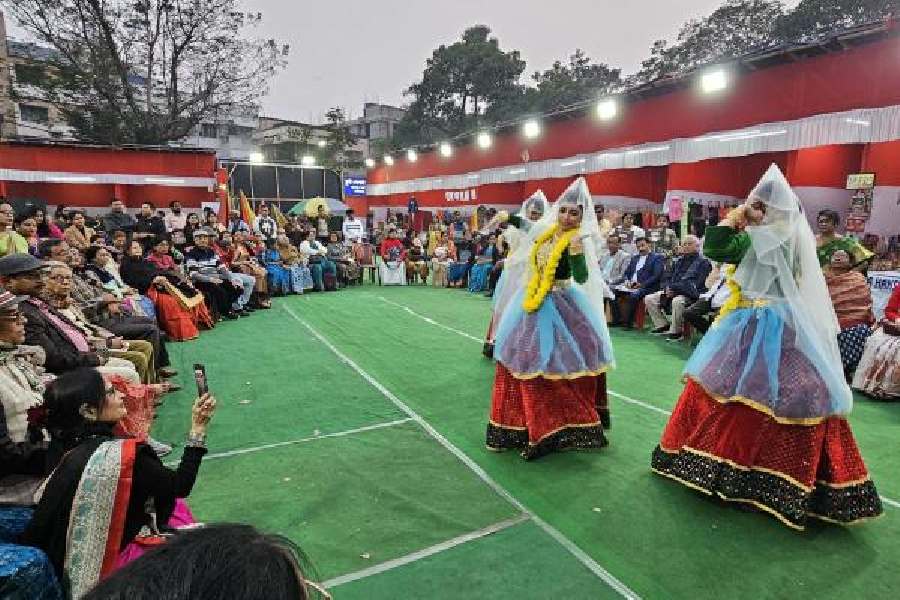About 450 people, gathered from across three continents, basked in the winter sun and nostalgia over rice and sheetal shutki on Sunday. The South Kolkata Sylhet Association was holding its two-day annual meet at a Jodhpur Park venue.
“Sheetal shutki (a dried fish) is a must on the menu when we Sylhetis meet,” said Tapan Das, a founder member of the association, one of 16 affiliates of the All India Federation of Sreehatta Sammilanis. “It is a bid by uprooted people to remain united,” he said.
Sylhet, or Sreehatta, was a division of undivided Bengal that spread over the current Sylhet region of Bangladesh as well as Karimganj, which became a part of Assam after Partition.
The programme started on Saturday with a performance of Dhamail dance, which is performed at Sylhet weddings. It was followed by Bihu and Manipuri recitals. The dance forms are regarded as part of the Sylheti culture, being from the same neighbourhood.
Bimolendu Dash, who has a master’s in music from Rabindra Bharati University, was the sole Bangladeshi who attended the gathering.
“We have over 450 folk poet-musicians in the region, from Hason Raja and Radharaman Dutta to Hemanga Biswas and Nirmalendu Chowdhury. Even Shah Abdul Karim (who received the Ekushe Padak, the highest civilian award of Bangladesh in 2001) and Kalikaprasad Bhattacharya (of the folk band Dohar) had roots in Sylhet. Sri Chaitanya’s ancestral house was in this area. A temple consecrated to him still stands in the locality. The region had its own script, too — Nagri,” Dash said.
Though the script is extinct in daily discourse, the Sylhetis try to keep their dialect alive. “Kalke aiba toh (You are coming tomorrow, right?)?” they asked each other as they dispersed on Saturday night.
Krishna Das, the president of the association who is also the president of the national federation, recalled attending a language quiz during a Sylhet conference at the botanical garden in Shibpur in the early 1960s when she had come on a student visa for her master’s at Jadavpur University.
The first Srihatta Sammelani had taken place in Calcutta, in 1876, at the instance of freedom fighters Bipin Chandra Pal, Sundari Mohan Das and Kamini Kumar Chanda, Krishna Das said.
Attempts to stay connected with the language take place at such meets.
“What is the meaning of khaujane? It is itching,” said Tapan Das, who conducts quiz contests on Sylheti words. “If a Sylheti tells
you yaktu ubai, what does
it mean? Wait a bit,” he smiled.
Distinguished Sylhetis, like former director-general of police Surajit Kar Purkayastha, and Bithika Deb, a former Assam MLA and an ex-president of the federation, were felicitated.
The chairman of the Silchar Development Authority, Manjul Deb, pledged ₹1 lakh to help build a guest house in Mumbai for Sylheti patients travelling for cancer treatment. Attendees had come from London and the US, too.
Stray references were made on stage to the attacks on minorities in Bangladesh. “Keep in touch with friends back in Sylhet. This is a calamity,” said singer Himanghshu Goswami, who left Bangladesh for Tripura in 1975, before settling in London two years later.
“We are still carrying the trauma of coming here as refugees in 1950. Ek ek bar mone hoy aar koto [How much more (would we suffer), I sometimes wonder],” said Manjul Deb.
Dash’s family is in Habiganj in Sylhet. “A temple has been vandalised in Moulavibazar and about 50 houses were burnt in Sunamganj. My hometown is slightly better off than these adjoining districts,” he said.
“We have lost our country; we are slowly but surely losing our language. But we have to cling on to our culture. It is our responsibility to preserve it,” Krishna Das, 83, who is the secretary of KPC Medical College and Hospital, appealed to the gathering.











